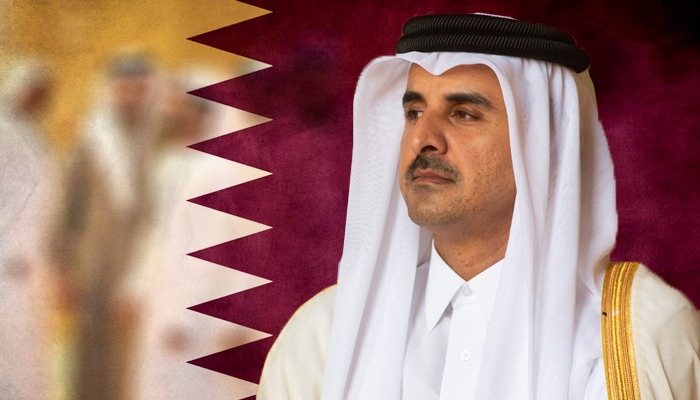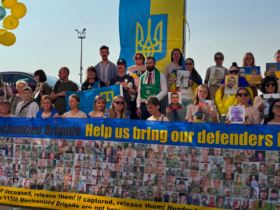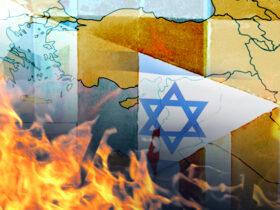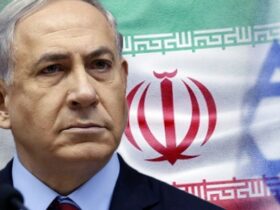The Qatar crisis was initially considered a minor ideological conflict between the Muslim Brotherhood and Wahhabist Islam; however, it has since evolved into a large-scale strategic battle due to the inexperience and naivety of Saudi rulers. If the current trend continues, the crisis could profoundly alter the fates of Qatar, Saudi Arabia and the entire Middle East.
QATAR’S STRENGTHS AND WEAKNESSES
Like any other country, Qatar has its strengths and weaknesses. However, Doha’s ambitious objectives and particular strategic conditions have significantly enhanced the country’s possibilities and potential risks.
Qatar’s strengths include the state of its energy production, its influential media reach and its extremely convenient foreign exchange reserves. Despite its size, the country is well endowed with natural energy resources: it is the world’s largest liquefied natural gas exporter, and has the world’s third-largest gas reserves. Qatar is also among the top ten countries in the world in terms of foreign exchange reserves, mainly due to its high gas sales and low population. Another indicator of Qatar’s power is its command of influential mass media resources at the international level, which will be discussed in the next section.
Al-Jazeera, insurgent TV station that divides the Arab world, faces closure https://t.co/jY9wifiIkC
— The Guardian (@guardian) July 2, 2017
The country’s weaknesses include its small geographical size and low population levels, and consequently, its limited military power. The country has an area of 11,500 square kilometers and a population of 2.5 million inhabitants, of which about 300,000 are indigenous people.
Qatar’s spacial restrictions restrict its military mobility, while the meager population-size of native Qataris has resulted in a shortage of military recruits. If a war were to break out, the indigenous population could also prove to be a major weakness.
Qatar has other geographic limitations, such as its being located on a peninsula. Qatar shares land borders with only Saudi Arabia and the UAE, two countries whose ongoing political tensions with Doha present serious threats.
Despite the tensions with land-locked neighbors, Qatar has several significant opportunities for improving friendly ties with other world powers, particularly Turkey, Iran and Russia. On top of that, the 2022 FIFA World Cup will be held in Qatar, which could prove to be an excellent opportunity for the country both economically and in the field of soft power.
QATAR’S SOFT POWER IN THE MIDDLE EAST
In the field of soft power, Qatar has two important factors working in its favor in terms of soft power: the mass media and sports.
Founded in 2003 by the Emir of Qatar, Al Jazeera has a strong influence over the people of the Middle East and even some regional rulers; it has become an essential part of the media landscape in the Middle East and Arab world. Al Jazeera is able to freely cover issues around the world as long as it avoids criticism of Qatar’s rulers, and already plays a vital role in Qatar’s hegemony in the Middle East. It strongly influences public opinion in the region (particularly among Arabs) toward the political, diplomatic, economic and cultural objectives of Qatar’s rulers.
As one of the most important sporting events in 2022, the FIFA World Cup has the potential to help Qatar both economically and diplomatically. One of the reasons that Saudi Arabia held back from attacking Qatar at the height of recent tensions was that Doha was working toward hosting this large-scale international event. If a Saudi military offensive against Qatar affected Doha’s ability to host the World Cup, it could very well have had disastrous consequences for the Kingdom. The World Cup could potentially even help Qatar improve relations with neighboring countries.
DIRECT CONFLICT WITH SAUDI ARABIA
Consisting of Saudi Arabia, Kuwait, Bahrain, Oman and Qatar, the Gulf Cooperation Council (GCC) is one of the leading vectors of Saudi Arabian power in the Middle East: the UAE and Bahrain are almost entirely under Riyadh’s influence. Over the past few months, the UAE has been trying to distinguish itself from Saudi Arabia; however, it remains firmly under the control of Riyadh in the Gulf Cooperation Council. Kuwait and Oman have also tried to act independently of the Saudi Kingdom, but remain aligned with Saudi policies.
Why did #Saudi and the other countries boycott #Qatar?
Was it rushed?
Here’s an interesting video to answer that ???? pic.twitter.com/Mjyjx4z7P2— 360 درجة (@360motions) September 21, 2019
Qatar, however, has never been entirely in line with the Saudis and has not been afraid to violate the Kingdom’s policy demands when doing so is in its interests. Over time, Qatar’s goals and influence have pushed the GCC’s objectives away from what Riyadh imagined they would be. The weakening of the council could be a serious threat to Saudi Arabia’s regional power.
Another hallmark of Saudi power is Wahhabi Islam. By promoting Brotherhood Islam, Qatar has both created a lever against Wahhabism and frightened Saudi rulers with national revolt by forces loyal to the Muslim Brotherhood.
THE SAUDI / EMIRATI / ISRAELI TRIANGLE
Saudi Arabia has been struggling for years to strengthen its position as the Arab world’s Big Brother by establishing a diplomatic coalition while attempting to counteract Iran and Russia’s regional influence. Riyadh had made serious efforts toward developing an alliance with Turkey and Pakistan; however, it ultimately failed to do so, eventually succeeding in dragging Egypt toward itself instead.
Israel is another player which can assist Saudi Arabia in its fight against Iran. The relationship is mutual, as Israel needs to cooperate with Egypt extensively in order to ward off threats from jihadist groups in Sinai. The common interests of Riyadh, Cairo and Tel Aviv resulted in Donald Trump laying the groundwork for a tripartite coalition when he traveled to the region in 2016.
Qatar’s support for the Muslim Brotherhood and regional conflict with Saudi Arabia have put it at odds with all three members of the triangle simultaneously. This is why we saw such hostility from them towards Qatar in 2017.
The primary goal of this triangle is to isolate and punish Qatar. Nevertheless, the pressure backfired, as it ended up pushing Doha to establish closer relations with Russia, Iran and Turkey.
THE ROLE OF RUSSIA, TURKEY AND IRAN IN EMPOWERING QATAR
Ankara has established strong relations with Doha, particularly as a result of their ongoing support for the Muslim Brotherhood. Right now, Qatar and Turkey are the only countries that formally support the Brotherhood. Despite the considerable differences in the form of government in these countries, they have managed to establish close ties in order to achieve a common goal.Another reason for Turkey and Qatar’s rapprochement is the ongoing crisis in the Persian Gulf. Erdogan has ambitious goals in the international arena, especially in the Middle East, one of which is establishing a strong Turkish presence in the Gulf. A 2014 military agreement between the two countries which sought to establish a Turkish military base in Qatar was the first of Ankara’s efforts to realize this goal. Since then, increasing tensions between Saudi Arabia and Qatar accelerated the process, and today Qatar has effectively become Turkey’s gateway into the Gulf.
‘Cooperation between Turkish and Qatari militaries has notably intensified since the #Saudi-led blockade on Qatar, and Turkey is only but strengthening its presence in the small Gulf region‘ https://t.co/aTKMVIh4We
— The New Arab (@The_NewArab) September 15, 2019
As one of the most influential countries in the Middle East, Russia has played a decisive role in regional politics, particularly in helping to end the crisis in Syria. Before tensions climaxed between Qatar and its neightbours, Moscow had already established close ties with Iran and Syria. With the onset of the crisis in Qatar, Russia has begun to act as a mediator, working to prevent Saudi Arabia from launching a war; all while increasing its own political influence in the region. This could lead to problems, as Qatar currently hosts the United States’ largest military base in the Middle East. Rapprochement between Qatar and Russia, especially in the economic and military arena, would undoubtedly have a lot of negative repercussions for US military forces in the area.
Russia and Qatar sign military cooperation deal @DailySabah https://t.co/1s9bhpGS4W pic.twitter.com/vaxJPTuT8N
— Stratfor (@Stratfor) October 26, 2017
Iran and Saudi Arabia are diplomatic, military, economic and cultural rivals, and every political element in the region serves as a pendulum in their ongoing play of power in some way or another; Qatar is no exception. From the beginning of the tensions between Doha and Riyadh, Iran has supported Qatar in order to weaken Saudi Arabia. The development of positive relations with Doha may not benefit Tehran directly but it may help weaken their regional rival.
IMPORTANT NOTES
Given its current potential, Qatar could end up a decisive force at the regional level. However, several points need to be taken into consideration:
- Due to Washington’s interest in maintaining relations with both Riyadh and Doha, the United States has so far failed to play an important role in the Qatar crisis. Accordingly, the forthcoming US presidential election will likely play a crucial role in determining future relations.
- The role of Israel in opposing Qatari influence should not be overlooked. Israel has powerful lobbies that will likely challenge Doha in the international sphere.
- Moscow, Tehran and Ankara are Qatar’s three main allies. There have always been friendly relationships between Moscow and Tehran, as well as between Ankara and Tehran. However, if diplomatic relations between Ankara and Moscow are amended, these three countries will be able to form a strong military, economic and diplomatic triangle that will serve as a powerful alliance with the capability to support Qatar’s ascent.

















Leave a Reply